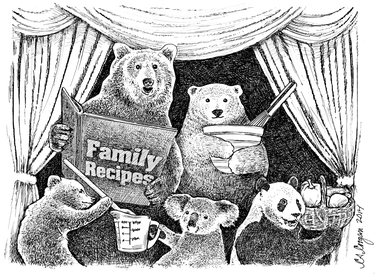Taking cues from a director, and taking care
The high school stage was dark at last Thursday’s play rehearsal.
The Guilderland Players were working on the jukebox musical All Shook Up. Rather than a curtain closing between scenes, the pieces of the set were being moved in the dark.
“You each have a job to do,” the director, Andy Maycock, advised the stagehands. “But, if you see someone with too much to do — help. Keep an eye out for someone who needs help.”
For years, we have admired Maycock’s relationship with the kids he directs. He can joke around with them. (In a later wedding scene, where he thought the large, wooden church altar was in the way, he asked for it to be moved, observing, to groans of glee from the crew, “We’re altar-ing our plans.”)
But, at rock bottom, Maycock treats the cast and crew like peers with a job to do, an important job. They respond in kind.
Several of the cast talked to us after rehearsal about how they felt like family. We thought about that later, wondering what it is that defines a family.
The Ozzie and Harriet stereotype — the breadwinning father married to the homemaking mother, raising their children — is no longer the norm. At our newspaper, when we write obituaries now, we always ask about the relationships in the parenthetical names after survivors. There are husbands and wives, of course, but there are also partners and significant others. Many times, there are survivors besides children who are a part of the family, close enough to be named.
When people define themselves, like The Guilderland Players, as family, we take that to mean they care about each other. At last week’s rehearsal, we heard words of encouragement, at the end of a song or scene, coming from the darkened theater seats: “I liked it.” “You were really good.”
“It’s a work environment,” said one of the players, high school junior Shane Walsh. “It gives us a sense of purpose we can’t get from academics.” Rather than being judged by teachers for grades, when the players are on stage, he said, “We’re judged by the audience and each other. We help each other grow.”
After he spoke those words, the group was quiet for a moment and then one of the players said she felt like crying. He had said it so well.
We are always impressed when people show their care for one another. We recently ran a front-page story by Justina Liu, a Guilderland High School senior, who had an internship with us. Her article was about the recent cuts in food stamps. Liu did her research well, gathering statistics, and interviewing government officials and experts in the field. She put a human face on the plight of those suffering from the cuts by telling the story of a 71-year-old widow, Nancy, living on her own, with a $74 monthly allotment in food stamps.
We hadn’t used Nancy’s last name in order to protect her identity; she was willing to talk to us frankly, inviting Liu into her home and answering her many questions. Nancy has nothing to be ashamed of; she has earned the benefits she is getting as a productive member of American society. But, until society catches up with that notion, we thought it best to protect her.
The week after the story ran, we got an anonymous letter in the mail. Usually, we detest anonymous missives because, most often, they are one-sided diatribes filled with venom. If a person is unwilling to sign a name, he or she can’t benefit from an exchange.
This letter was different. The writer remained anonymous out of humility. She (it seemed like a woman to us because of the engraved stationary lettered with an “M” and the fine cursive hand) wrote: “Please give this gift card to Nancy, the woman you profiled in last week’s issue about food stamps.”
She had enclosed a gift card to the very supermarket Nancy had said she shopped at on Sundays, combining it with her trip to church. The writer was thoughtful enough to enclose a stamp as well.
She went on, “Her story touched me and I sympathize with her. When I go to the grocery store, I buy whatever I want, with no fear of not having enough money and I want to share something with her. Hopefully, she can treat herself to something special — maybe something she doesn’t normally get.”
When we called Nancy to tell her about the gift, she exclaimed, “Good Lord!” She joyously repeated the phrase several times.
We suddenly felt joyous ourselves. In our editorial that had run with Liu’s story on food stamps, we had called for changes that would close the gap between rich and poor. For one wonderful moment, the big important changes — or, rather the lack of them — didn’t matter so much, didn’t sting so badly.
One person had taken care of another.
Our newspaper itself has been the beneficiary of such unexpected kindness of late. It seems that the worst of the snowstorms in this long and bitter-cold winter have come most often on our production day. We toil on Wednesdays well into the wee hours of Thursday mornings, sending our pages electronically to the printer in Gloversville by the 5 a.m. deadline.
One Thursday morning, in the midst of a storm, our publisher’s 2001 pickup truck, laden with thousands of our freshly printed papers, ended up in a ditch close to Altamont. One call to Warren’s Auto Body Shop in Duanesburg and Warren Alexson dropped what he was doing and, in the middle of a snowstorm, arrived at the scene with his tow truck to set the pickup and its papers free.
He refused payment.
Why?
He said simply: “The paper has to get out.”
So next time we’re in the dark — speaking metaphorically — we’re going to keep the play director’s words in mind:
“You each have a job to do. But, if you see someone with too much to do — help. Keep an eye out for someone who needs help.”
— Melissa Hale-Spencer


